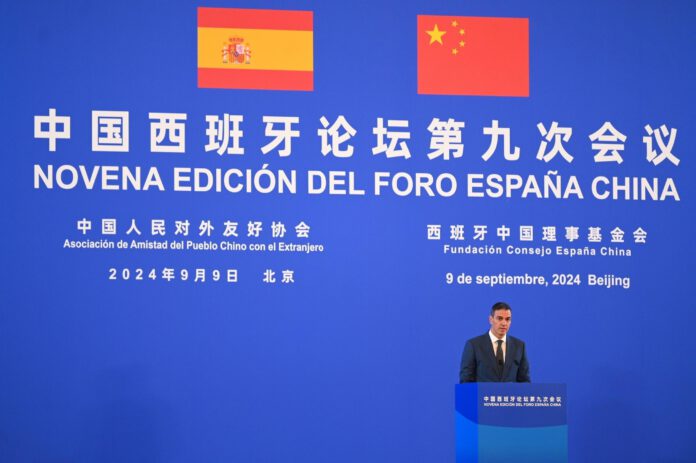
During an official visit to China from September 8th to 11th, Spanish Prime Minister Pedro Sánchez addressed growing tensions over European Union tariffs on Chinese goods. When asked about the issue, Sánchez emphasized the need to avoid further trade disputes, stating, “We don’t need another war, a trade war.”
He stressed the importance of fostering cooperation between the EU and China, saying, “I think we need to build bridges. Spain will be constructive and try to find a solution, a compromise.” Sánchez’s comments highlighted his call for restraint as the EU and China inch closer to a trade conflict. “All of us— not only EU member states but also the European Commission—need to reconsider this decision,” he added, urging collective reflection on the EU’s stance.
The situation has intensified since October 4, 2023, when the EU launched a countervailing subsidy investigation into Chinese electric vehicles (EVs). The EU argues that Chinese EV companies benefit unfairly from state subsidies, allowing them to undercut European competitors with low prices. The European Commission had already announced in August plans to impose a surtax of up to 36% on Chinese EV imports for five years, in addition to the existing 10% tariff. Notably, the US-based Tesla, which operates a factory in Shanghai, is also subject to these measures.
These tariffs are part of the EU’s strategy to protect its domestic automotive industry, which employs 14.6 million people. However, the bloc is treading carefully to avoid provoking a “deadly” conflict with China, its second-largest trading partner. In the coming weeks, EU member states are expected to vote on whether to formally impose the five-year countervailing duties. During a consultative vote in July, 12 EU countries, including Spain, supported the measure.
China has retaliated by launching anti-dumping investigations into European exports, including dairy and pork products. Although the popularity of Iberian ham has remained unaffected, Spain, the EU’s largest pork exporter to China, is on high alert. Last year alone, Spain exported over 560,000 tons of pork to China, valued at €1.2 billion, according to industry group Interporc.
As both sides escalate retaliatory measures, the economic stakes for Spain and other EU member states are growing. Sánchez’s visit and subsequent remarks suggest that Spain may seek a more balanced approach, emphasizing diplomacy to avoid further trade disruptions with China.
The Echo suggests that Sánchez’s visit to China was a strategic move to calm the brewing conflict and secure Spain’s trade relations with the Asian powerhouse. Sánchez’s mission was not only to navigate the turbulent waters caused by the European Union’s recent tariffs on Chinese electric vehicles but also to strengthen economic cooperation with China, particularly in areas critical to Spain’s industrial transformation. Chinese companies, according to the analysis, are key players in this transformation, particularly in sectors like electric vehicles (EVs), hydrogen energy, and green infrastructure.
At a press conference on September 11th, Sánchez reiterated Spain’s commitment to being an “ally” to Chinese enterprises and positioned Spain as a gateway for these businesses into the European market. He emphasized the potential for expanded collaboration in fields such as EVs, green hydrogen, sustainable infrastructure, the circular economy, and energy efficiency. “We want the EU and China to open up to the world,” Sánchez declared, expressing a desire for “honest dialogue” to ease the rising tensions, which he attributed largely to the EU’s recent decision to impose tariffs on Chinese electric vehicles.
Sánchez’s comments were made against the backdrop of significant Chinese investment in Spain. For example, Chinese company Envision Energy has begun constructing Europe’s first lithium iron phosphate battery superfactory in Spain. During Sánchez’s visit, the Spanish government signed a landmark hydrogen energy cooperation agreement with Envision Energy. The deal includes a $1 billion investment to establish a zero-carbon hydrogen energy industrial park in Spain, with the goal of supporting Spain and Europe’s transition to carbon neutrality and fostering a new green industrial ecosystem.
China’s role in Spain’s economic future extends beyond hydrogen energy. The Iberian Peninsula has emerged as the gateway for numerous Chinese electric vehicle brands to enter the European market. Leading companies such as BYD, MG, Omoda, Jaecoo, DFSK, and Lynk & Co have all expanded their presence in Spain, which is now the fourth-largest market for EV sales in the EU. Experts note that the absence of a dominant national automotive brand in Spain has created an opening for Chinese automakers to capture market share, particularly among Spain’s price-sensitive consumers.
Sánchez’s diplomatic efforts reflect Spain’s delicate position in the midst of EU-China trade tensions. The country’s automotive industry, along with related parts suppliers and sectors, depends heavily on Chinese investments to maintain operations. Chinese automaker Chery, for example, announced in April that it would open its first European assembly plant in Barcelona. SAIC Motor, another Chinese giant, expressed interest in establishing its first European plant in Spain during Sánchez’s visit.
The growing economic interdependence between Spain and China underscores the complexity of the EU’s broader trade dispute with China. For Spain, calming tensions and fostering deeper industrial partnerships with Chinese companies is essential not only for maintaining its own economic stability but also for advancing its role in Europe’s green energy transition.
Source: RFI, Xinhua, noticiaslatam



